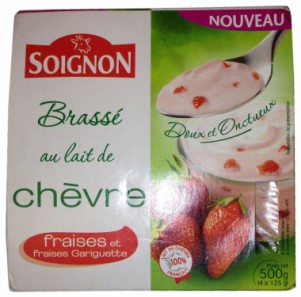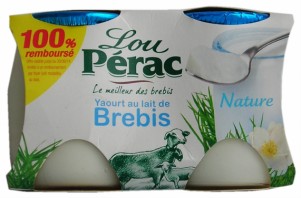While many brands across Europe rely on cows for their dairy produce; France is turning to other farmyard favourites and is consequently leading the way in dairy innovation. Indeed, France is one of the most prolific countries when it comes to goat/ewe/ sheep’s milk yogurt and chilled desserts, accounting for just over a fifth of all launches in 2013-14.
New goat/ewe/sheep’s milk yogurts focus on taste

However, unlike many goat’s milk yogurts, the packaging does not actually feature a visual image of a goat to inform the milk source, suggesting Soignon is looking to appeal to a broad audience. The back of pack explains that Soignon yogurts “bring the whole family goat’s milk natural goodness.”
Soignon is not the only brand venturing away from traditional dairy sources. In 2014 Nestlé Lactalis joint-venture (LNPF) also entered the segment with the launch of a sheep’s milk yogurt. Sold under Lou Pérac – Lactalis’ brand of sheep’s cheese – the range includes a plain variant, as well as a variant with ‘red fruit’ (i.e. berries) at the bottom.
A suitable alternative for cow’s milk intolerant consumers
In France, goat/ewe/sheep’s milk yogurts are often positioned by brands as easier to digest than cow’s milk yogurt, even though they contain lactose. For some consumers, goat’s milk yogurts are actually easier to digest. The fat globules in goat’s milk are generally smaller than those in cow’s milk, so the digestive enzymes can complete their breakdown more rapidly. Goat’s milk yogurts can therefore be a suitable alternative for consumers who are intolerant to milk, i.e. those who are intolerant to some milk protein.
Cow’s milk alternatives also appeal to the third of yogurt eaters who would like to see more low/lactose free yogurts available in supermarkets. However, despite the demand – low/no/reduced innovation in yogurt and chilled desserts only account for 1% of product launches in 2014, compared to 2% in neighbouring Germany and nearly 10% in Sweden.
However, although a significant number of French consumers find discomfort in consuming milk, they are not ready to give up on eating dairy altogether. In fact, close to one in five French consumers claim that drinking milk can upset their digestive system.
For French yogurt lovers, non-dairy yogurts offer a polarising solution. 26% of yogurt eaters disagree with the idea that non-dairy yogurts are better for them than dairy products, yet a similar proportion (24%) agree.
Milk source gives artisan credentials
Beyond any health benefits, the use of different types of animal milk gives authentic and artisan credentials to yogurt and chilled desserts, which are reinforced by the fact that products are sold under relatively niche or speciality brands. As such, Lou Pérac ewe’s milk yogurt packaging does not mention its ultimate owner (LNPF).
Moreover, a significant share of goat/ewe/sheep’s milk yogurts and desserts are organic certified. Organic claims accounted for over half of the French launches of goat/ewe/sheep’s milk yogurts and chilled desserts in 2013-14, compared to 14% across both segments as a whole.
Overall, continuing to show the potential in the market, the number of new goat/ ewe/ sheep’s milk yogurt and desserts launched in France between 2013 and 2014 grew faster than the overall category. Goat/ewe/sheep’s milk based yogurt and chilled desserts accounted for 5% of the 2014 launches in France across both segments.
Caroline Roux, Research Manager, Food & Drink at Mintel, heads up the global food and drink analyst team based in London as well as being a specialist dairy analyst. She provides robust consumer insights and realistic recommendations to dairy companies, and tracks global innovation and consumer trends to assist clients in their growth strategies.Prior to Mintel, Caroline managed brand strategy in the UK and France for an FTSE 250 dairy company.









































